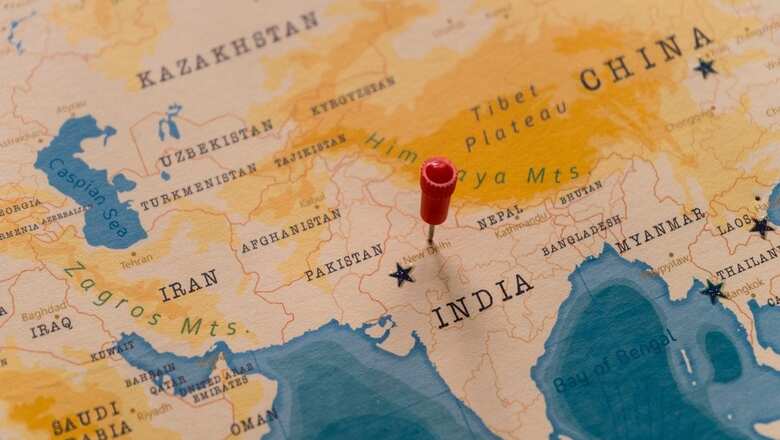
views
India appears beset on all sides by disruptive forces. China remains a toxic element. Pakistan, fresh off a turbulent election, is a loose cannon. Small fry like the Maldives are irritants. Bangladesh, Nepal and Sri Lanka blow hot and cold.
Beyond the neighbourhood, strategic partners like the United States use the deep state, packed with neo-cons, to needle India when New Delhi’s autonomous foreign policy rankles beyond a point.
Canada hasn’t recovered its poise from India evicting 41 Canadian diplomats from the country. First-world nations aren’t used to such peremptory treatment from the Third World.
The second anniversary of Russia’s invasion of Ukraine falls on February 24, 2024. Western sanctions haven’t worked on Moscow. The rouble has recovered. Defying expectations, Russia’s GDP grew 3.6 per cent in 2023. India continues to buy Russian crude, refine it, and sell it back to Europe as diesel.
India’s economy meanwhile powers on at above 7 per cent a year while Europe’s largest economy, Germany, slips into recession.
The International Monetary Fund (IMF) projects average global growth in 2024-25 at just over 2 per cent. It projects India’s GDP growth at more than thrice the global average.
With China caught in a downward economic spiral, President Xi Jinping recently met with the country’s top finance authorities to stem China’s fall into Japan-like stagflation.
Beijing last week sacked Yi Huiman as chairman of the China Securities Regulatory Commission (CSRC). He has been replaced by Wu Qing, a former head of the Shanghai Stock Exchange.
The US economy, in contrast, is growing faster than expected at 2.5 per cent a year. Inflation has dipped to 2 per cent. The Federal Reserve is likely to start lowering interest rates from May 2024. Three rate cuts of 0.5 per cent each — from the current level of 5.25 per cent down to 3.75 per cent — are likely in calendar 2024.
If that happens, India’s already bullish stock market will be on steroids.
Foreign funds have few places to invest profitably once the Fed’s rate falls to 3.75 per cent. China remains an outcast. In a presidential election year, US politicians, Republicans and Democrats, will vie with one another to be tough with China.
Cutting China Off
Technology sanctions on Beijing are likely to widen. The US-led ban on selling advanced chips to Beijing has already set China’s semiconductor industry back by half a decade.
China has meanwhile shot itself in the foot. It passed draconian criminal laws on foreign companies sharing their data with headquarters outside China. This has caused an exodus of foreign executives from China fearing prosecution and jail terms if they transmit their own corporate data back to Washington or London.
With JP Morgan including India in its widely tracked Government Bond Index-Emerging Markets (GBI-EM) from June 2024, over $20 billion is expected to flow into Indian securities, boosting overall sentiment and integrating Indian financial markets into the global ecosystem.
India’s stock market capitalisation of $4.3 trillion overtook Hong Kong’s stock market cap last month. It is now the world’s fourth largest stock market by capitalisation after the US ($50.86 trillion), China ($8.44 trillion) and Japan ($6.36 trillion).
With CIA agents thick on the ground in India, Washington knows exactly what this data means. For America’s deep state, dealing with one Asian power — China — is bad enough.
Dealing with another rising Asian power — India — which is supposed to be America’s strategic partner requires more nuanced policymaking.
No proof
For a country that assassinates targets on foreign soil at will, it takes exceptional hubris for the US to move a New York court over an unproved allegation of a murder-for-hire plot by Indian businessman Nikhil Gupta.
The FBI arrested Gupta at Prague airport without a formal charge sheet for an alleged plot to assassinate the known fugitive Gurpatwant Singh Pannun.
Pannun, proscribed as a terrorist by Indian authorities, has over the years engaged in criminal activities that should have landed him in jail in any democracy that respects the rule of law. In the US, however, he remains free to issue video threats to bomb Air India aircraft and the Indian Parliament.
These may be empty threats but they are criminal offences. The US flouts laws it expects other countries to follow.
Washington wanted Nikhil Gupta to be extradited from the Czech Republic as soon as it unsealed an indictment of murder-for-hire against Gupta — despite an unexplained delay of five months between Gupta’s arrest in Prague on June 30 and the unsealing of his indictment in the New York court on November 29.
Noting this background, the highest court in the Czech Republic — the Constitutional Court — has paused the extradition of Gupta to the US. The final decision will rest with the Czech Justice Minister.
The FBI has made its case look like a vendetta by refusing, at a court hearing in New York, to share with Gupta’s defence lawyers any evidence it claimed to have on the alleged plot to kill Pannun.
Pannun meanwhile continues to make threats against the Indian state which would count as criminal offences in a law-abiding democracy.
India needs to now calibrate with astute statesmanship its strategic relationships in a complex world wracked by wars in Europe and the Middle East.
For the West, India is an invaluable ally against the China-Russia-Iran-North Korea axis. But for the first time since the end of the Second World War in 1945, the West is dealing with a non-Western democracy whose economy will be the world’s third-largest by 2029.
The West needs a strong India to counter the China-Russia threat. But not an India so strong that, two decades later, it becomes an economic, technological and military competitor rather than the strategic partner it is today, serving the West’s geopolitical ends.
The writer is an editor, author and publisher. Views expressed in the above piece are personal and solely that of the author. They do not necessarily reflect News18’s views.



















Comments
0 comment